The NVIDIA GeForce GTX 780 Ti Review
by Ryan Smith on November 7, 2013 9:01 AM ESTOverclocking
Finally, let’s spend a bit of time looking at the overclocking prospects for the GTX 780 Ti. Although GTX 780 Ti is now the fastest GK110 part, based on what we've seen with GTX 780 and GTX Titan there should still be some headroom to play with. Meanwhile there will also be the matter of memory overclocking, as 7GHz GDDR5 on a 384-bit bus presents us with a new baseline that we haven't seen before.
| GeForce GTX 780 Ti Overclocking | ||||
| Stock | Overclocked | |||
| Core Clock | 876MHz | 1026MHz | ||
| Boost Clock | 928MHz | 1078MHz | ||
| Max Boost Clock | 1020MHz | 1169MHz | ||
| Memory Clock | 7GHz | 7.6GHz | ||
| Max Voltage | 1.187v | 1.187v | ||
Overall our overclock for the GTX 780 Ti is a bit on the low side compared to the other GTX 780 cards we’ve seen in the past, but not immensely so. With a GPU overclock of 150MHz, we’re able to push the base clock and maximum boost clocks ahead by 17% and 14% respectively, which should further extend NVIDIA’s performance lead by a similar amount.
Meanwhile the inability to unlock a higher boost bin through overvolting is somewhat disappointing, as this is the first time we’ve seen this happen. To be clear here GTX 780 Ti does support overvolting – our card offers up to another 75mV of voltage – however on closer examination our card doesn’t have a higher bin within reach; 75mV isn’t enough to reach the next validated bin. Apparently this is something that can happen with the way NVIDIA bins their chips and implements overvolting, though this the first time we’ve seen a card actually suffer from this. The end result is that it limits our ability to boost at the highest bins, as we’d normally have a bin or two unlocked to further increase the maximum boost clock.
As for memory overclocking, we were able to squeeze out a bit more out of our 7GHz GDDR5, pushing our memory clock 600MHz (9%) higher to 7.6GHz. Memory overclocking is always something of a roll of the dice, so it’s not clear here whether this is average or not for a GK110 setup with 7GHz GDDR5. Given the general drawbacks of a wider memory bus we wouldn’t be surprised if this was average, but at the same time in practice GK110 cards haven’t shown themselves to be as memory bandwidth limited as GK104 cards. So 9%, though a smaller gain than what we’ve seen on other cards, should still provide GTX 780 Ti with enough to keep the overclocked GPU well fed.
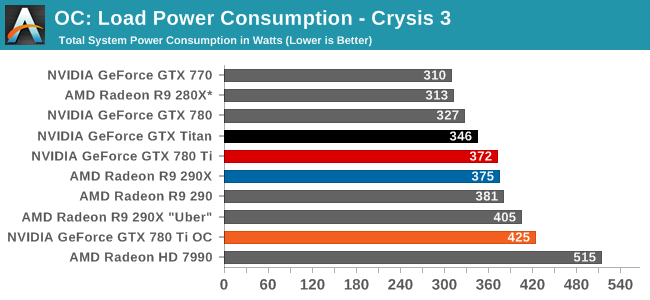
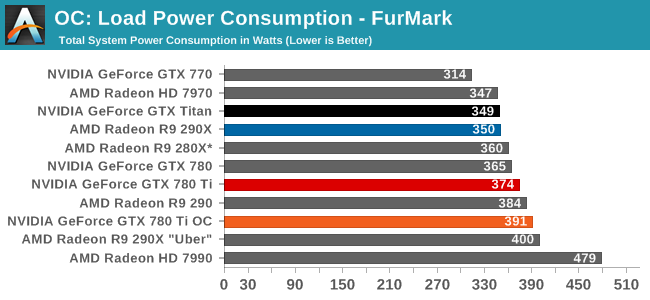
Starting as always with power, temperatures, and noise, we can see that overclocking GTX 780 Ti further increases its power consumption, and to roughly the same degree as what we’ve seen with GTX 780 and GTX Titan in the past. With a maximum TDP of just 106% (265W) the change isn’t so much that the card’s power limit has been significantly lifted – as indicated by FurMark – but rather raising the temperature limit virtually eliminates temperature throttling and as such allows the card to more frequently stay at its highest, most power hungry boost bins.
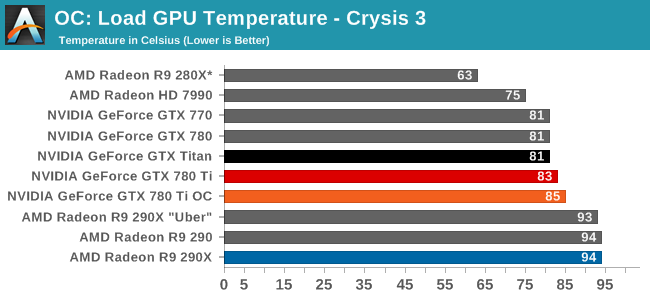
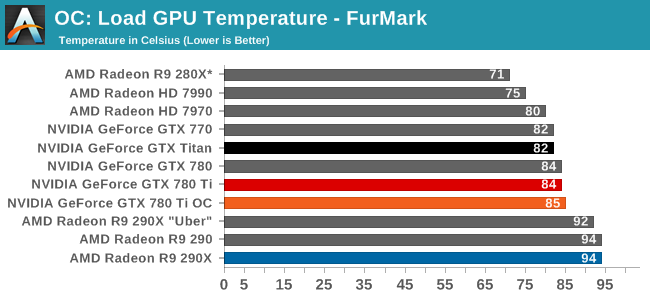
Despite the 95C temperature target we use for overclocking, the GTX 780 Ti finds its new equilibrium point at 85C. The fan will ramp up long before it allows us to get into the 90s.
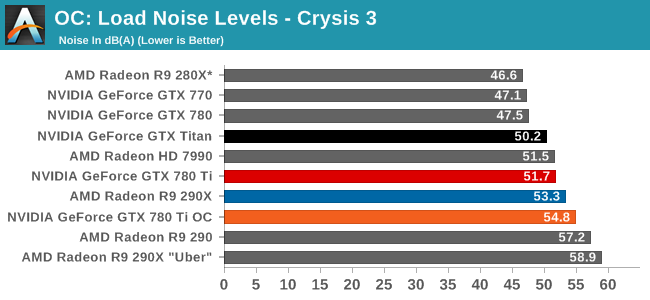
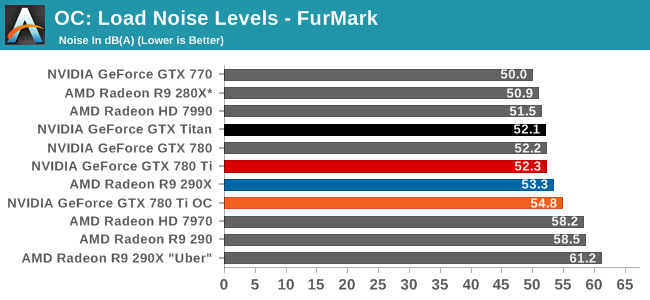
Given the power jump we saw with Crysis 3 the noise ramp up is surprisingly decent. A 3dB rise in noise is going to be noticeable, but even in these overclocked conditions it will avoid being an ear splitting change. To that end overclocking means we’re getting off of GK110’s standard noise efficiency curve just as it does for power, so the cost will almost always outpace the payoff on a relative basis.
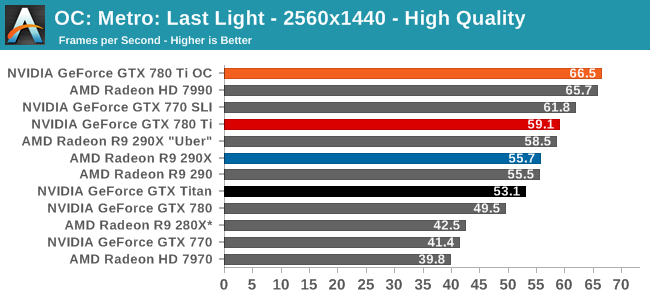
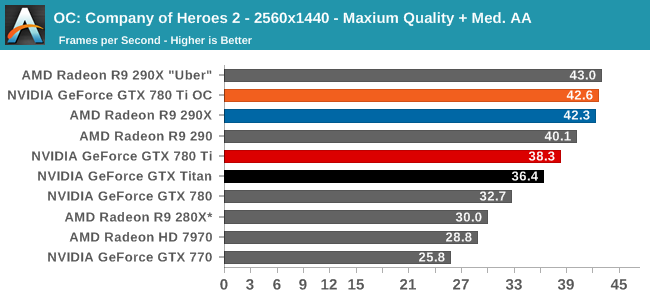
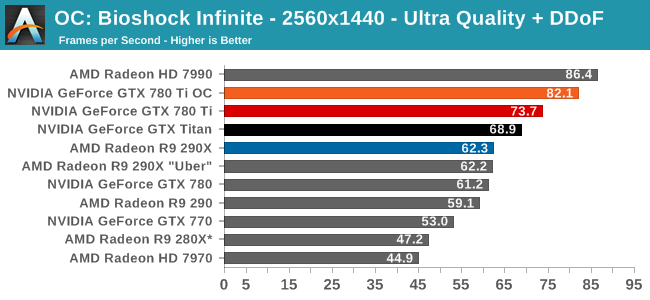
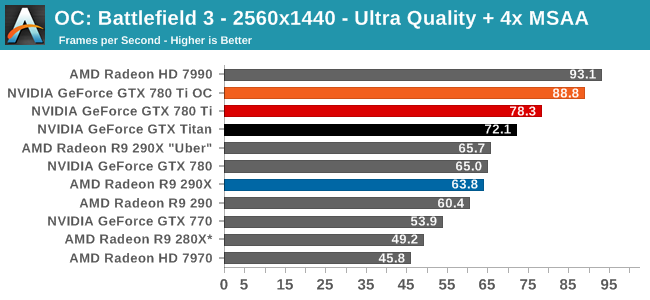
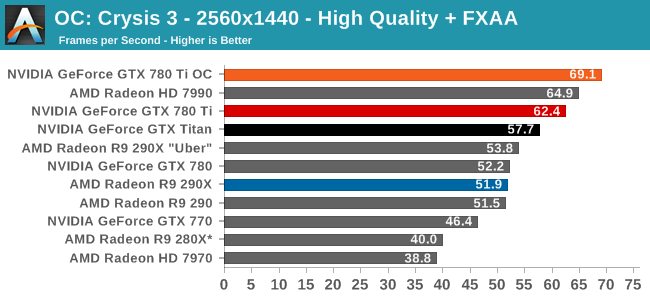
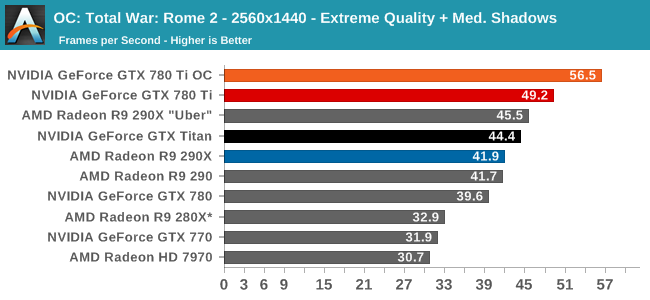
Finally, looking at gaming performance the the overall performance gains for overclocking are generally consistent. Between our 6 games we see a 10-14% performance increase, all in excess of the memory overclock and closely tracking the GPU overclock. GTX 780 Ti is already the fastest single-GPU card, so this only further improves its performance lead. But it does so while cutting into whatever is above it, be it the games where the stock 290X has a lead, or multi-GPU setups such as the 7990.










302 Comments
View All Comments
bronopoly - Thursday, November 7, 2013 - link
Who plays at 60 fps? Surely not people playing games competitively.Tetracycloide - Thursday, November 7, 2013 - link
They don't include 1080p because they assumed no one would be stupid enough to buy a $700 card for 1080p gaming. I guess you showed them...Ryan Smith - Thursday, November 7, 2013 - link
We actually have the 1080p data, however we didn't publish it since it's not a resolution we're really expecting this card to be used with. When GPU Bench 14 goes live, that data will be available alongside everything else.bronopoly - Thursday, November 7, 2013 - link
I need 120 fps for my games when I'm using lightboost or 144 fps when I'm not using it. A lot of people aren't satisfied with 60 fps on good settings. When I go from a high framerate to something as awful as 60 fps, I usually restart my computer because I think something is wrong.Mondozai - Thursday, November 7, 2013 - link
The vast majority of people play at 60 fps. Including most people buying a high-end card. And the move is towards 4K over the next few years. You'll probably be stuck at 1080p for a long time if you insist on 120-144 fps while we will get 4K monitors next year for relatively affordable prices and even more so in 2015.That's your right. But cards like these are not going to be tailored towards people who want as high a fps as possible as opposed to as high a graphics fidelity as possible where 60 fps is the acceptable threshold. You can whine and bitch about it as much as you want. Won't make a difference.
HisDivineOrder - Thursday, November 7, 2013 - link
Where are these "properly-cooled 'GHZ' Editions of the R290X?" If they existed, you might have an argument, but they don't. So talk about what exists.Even HardOCP--between ignoring the ear-piercing sound of the 290X at 55% fanspeed--admitted they had seen and heard nothing of custom coolers for the R9 290/290X yet and that doesn't bode well.
So if you're waiting for a custom cooler to show up and save the R9 series, it looks like they're far, far away...
Tetracycloide - Thursday, November 7, 2013 - link
"Let's all pretend we suffer from a crippling lack of foresight!"OverclockedCeleron - Thursday, November 7, 2013 - link
1) Everyone knows what comes after a GPU announcement [hint: an avalanche of custom GPUs based on that GPU].2) Many reviewing sites have said that AMD is preventing their partners from producing custom R290X gpus until 780 Ti is released. Can you guess why ;-)?
bronopoly - Thursday, November 7, 2013 - link
Can I just make stuff up too?3) Insert wild speculation and conspiracy
Mondozai - Thursday, November 7, 2013 - link
Someone's got an NV card and wants to defend it to death :D